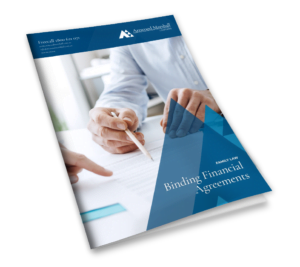Attwood Marshall Lawyers Family Law Senior Associate Hayley Condon joins Robyn Hyland on Radio 4CRB for ‘Law Talks’ to discuss the rising popularity of prenuptial agreements.
2023 was a big year for celebrity breakups, shedding light on the drama that unfolds when couples part ways.
We watched as Hugh Jackman and Deborra-Lee Furness announced their separation in September 2023. The much-loved Eric McCormack, from Will & Grace, and his former wife Janet also filed for divorce. Sofia Vergara and her husband, Joe Manganiello, called it quits, relying on a prenuptial agreement to settle the terms of their divorce, and Real Housewives of Beverly Hills fan-favourite Kyle Richards also announced her separation from her husband of 27 years, Mauricio Umansky, last year.
Beyond the headlines, a common question often arises: did they have a prenup? Prenuptial agreements can be valuable for all couples, not just for the rich and famous!
In Australia, prenuptial agreements are termed Section 90B Financial Agreements in the Family Law Act; however, this description is not well-known, and many Australians still use the more widely recognised term “prenup” when referring to financial agreements before marriage.
Over the years, there has been a surge in the popularity of prenuptial agreements. Data shows that the number of couples with prenups has risen from 3 per cent in 2010 to 15 per cent in 2022.
What was once viewed as unromantic or bad luck is now considered a sensible precaution, especially for those entering second or third marriages.
We know all too well the impact divorce can have on the wealth of a family. So, it is no surprise that more people are considering a prenuptial agreement to implement a safety net for their financial future when entering a new marriage.
How does a couple establish a prenup?
Establishing a prenuptial agreement is a structured process that requires careful consideration and legal guidance. Rushing into such agreements is discouraged, as it is not an overnight process and should never be entered in circumstances of undue pressure. There should not be ink on the wedding dress, so to speak.
Parties should avoid entering into agreements they do not feel comfortable with or fully understand, as this may jeopardise the strength or validity of the agreement in the future, especially after a separation when such issues tend to surface.
If you are considering a pre-nuptial agreement, the initial step is to engage an experienced family lawyer to discuss the essential terms.
A meeting with a family lawyer will involve:
- Disclosure of finances: Discussing each party’s assets, liabilities, and financial resources and their value. A schedule of the financial position of each party would be included in the agreement. This means that the parties disclose their full financial position to the other party before entering into the agreement. This is an integral part of the agreement but can often be confronting part of the process for parties to bear their full financial position if these such discussions have not occurred in the past.
- Specific terms: Detailed discussions on the division of individual and joint property if a separation were to occur in the future. Provisions may be included in the agreement addressing spousal maintenance and who will move out of the family home and the associated timeline.
Both parties must have separate legal representation during the process and receive independent advice regarding the terms of the agreement prior to it being signed, as required by the Family Law Act.
Once the agreement has been prepared by one party’s lawyer, the document is then provided to the other party to review with their lawyer. There is often negotiation over the terms of the agreement at this stage until both parties are satisfied with the document.
The final step involves each party executing the agreement, typically in the presence of their respective lawyers, and their respective lawyers each signing a statement of independent legal advice that is annexed to the agreement. With these steps completed, a binding agreement is in place for the couple.
The benefits of a prenup
Usually, two matters are central to a divorce: parenting arrangements and property division.
A prenuptial agreement serves as a constructive tool, fostering open conversations about finances between couples and establishing expectations and responsibilities from the outset.
This proactive approach to addressing financial matters can contribute to the overall well-being of the relationship by preventing disputes down the road.
By entering into a prenuptial-agreement, a couple can clearly outline the division of their joint and individual property in the event of future separation. This helps avoid the stress, cost, unpleasantness and uncertainty of post-separation negotiations or litigation.
A properly executed prenuptial agreement is legally binding, providing peace of mind to both parties involved.
A prenuptial agreement offers a level of privacy for the couple. Typically, the agreement involves only the parties, and in the event of a separation, adherence to the agreed terms allows for a streamlined property settlement without involving courts or third parties.
Consideration of the cost factor is another significant advantage. The legal costs incurred in establishing and regularly reviewing these agreements are notably less than the substantial legal costs that could be incurred in post-separation dispute resolution strategies or litigation.
Does a prenup override an existing Will?
When a couple establishes a prenuptial agreement prior to their marriage, it is crucial that they consider the structure of their Will and other estate planning documents.
This ensures that the terms of the agreement are appropriately reflected in their testamentary intentions.
Ordinarily, a prenuptial agreement will not preclude the couple from leaving their whole estate or specific property owned by them to their spouse in their Will. The documents however should work together.
If the property settlement terms of the prenuptial agreement are triggered upon the death of a party and the deceased spouse’s Will is inconsistent with the terms of the agreement, then an issue arises. If the Will allows the surviving spouse to inherit the deceased spouse’s entire estate, then the Will may stand, provided the Will is deemed valid.
Proper coordination between the prenuptial agreement and the Will is essential to avoid potential conflicts and ensure that both documents align seamlessly with the couple’s intentions.
Do prenups stand the test of time?
Prenuptial agreements are established before a couple marries, aiming to address common scenarios that may arise in their relationship; however, they cannot cover everything.
A prenuptial agreement, or any financial agreement, does not have an expiration date. They remain in effect over time. Yet, the occurrence of life events during the marriage may significantly impact the enforceability of the agreement after a separation.
This is why it is essential to regularly review your agreement, say every five years, or in response to significant life events not initially considered. If necessary, updating the agreement to reflect these changes helps to keep it current and relevant to the circumstances of the couple.
Equally important is the adherence to the agreed-upon terms set out in the agreement during the marriage. If either party fails to follow the terms of the agreement, it can expose the agreement to potential challenge, which may result in the agreement being set aside after separation.
How can Attwood Marshall Lawyers help?
If you are considering entering a prenuptial agreement, seeking professional advice to discuss your unique circumstances is best. An experienced family lawyer can guide you on what should be included in the document and how to protect your best interests.
Attwood Marshall Lawyers is a highly-trusted leading family law firm. We believe in helping families maintain positive relationships and resolve disputes efficiently when they arise to allow all parties to move on with their lives as quickly as possible.
If you need help with a family law matter, including entering a financial agreement, our Family Law team are ready to help. Please get in touch with our Family Law Department Manager, Donna Tolley, on direct line 07 5506 8241, email dtolley@attwoodmarshall.com.au or free call 1800 621 071 to arrange an appointment.
Alternatively, you can book an appointment instantly using our online booking app. Click here to book online now.
 Free Info Pack
Free Info Pack
To find out more about prenups and binding financial agreements, provide your details and our Information Pack will be sent to your inbox.
 Free Info Pack
Free Info Pack
